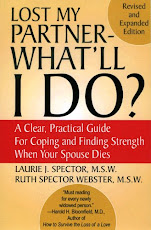
One of the most difficult steps after losing your spouse/partner is planning your first vacation without him or her. You probably aren’t feeling like your usual self, so it can be hard to summon the happy anticipation that “getting away” used to bring. Visiting familiar places can bring back the pain of the loss.
Before you start making reservations, consider the following:
a. Team up with a family member or friend who is compatible. If you’re uncertain how you’ll get along, try going away for a weekend together before committing to a longer trip.
b. New places can offer new experiences and a chance to create new memories.
c. Keep in mind that feelings of loss may come up unexpectedly. Give yourself permission to grieve even though you’re supposed to be “getting away” from things.
d. If you find yourself traveling constantly the first year after the death, it may be a way of avoiding the mourning process. Grief has a way of catching up when not attended to.
e. Don’t be surprised if, when you return home, there’s a moment when you expect to be greeted by your spouse/partner.
Despite some discomforts, taking a vacation on your own can also be filled with pleasurable new discoveries and opportunities for gaining self-confidence.








